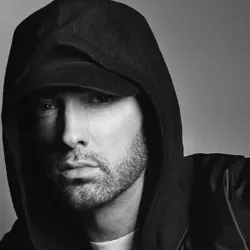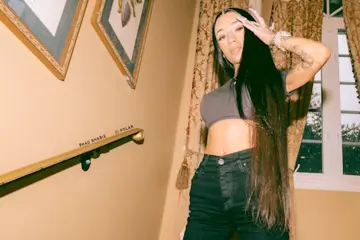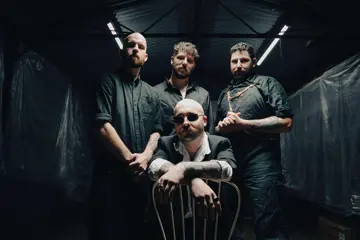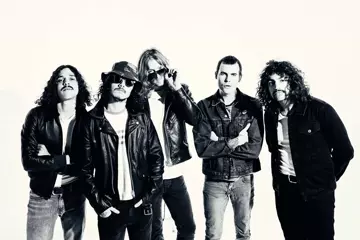 Eminem
EminemIn the lead up to the release of Mariah Carey's 2018 comeback, Caution, fans initiated a social media campaign to vindicate her 2001 'flop' Glitter movie and soundtrack. Remarkably, the album, unavailable on streaming platforms, topped the US iTunes Album Charts.
Early in the new millennium, Carey was at her apex. She left Sony Music (and ex-husband Tommy Mottola's auspices) for Virgin Records, inking a much-hyped US$100 million five-album deal. A musical drama directed by Gridlock'd's Vondie Curtis-Hall, Glitter was supposed to be the super-diva's counterpart to Prince's Purple Rain or Whitney Houston's The Bodyguard. Carey, then equated with romantic balladry and hip hop-spliced R&B, switched up her style for Glitter. Given the film's '80s setting, she recorded retro disco, R&B and electro-funk. The OST's key single, Loverboy, sampled Cameo's Candy, and Carey covered throwback tunes like Indeep's club classic Last Night A DJ Saved My Life (featuring Fabolous, Busta Rhymes and DJ Clue?).
Aspects of Glitter's troubled roll-out would be beyond anyone's control. During her promo appearances, Carey displayed what was insensitively reported as 'erratic behaviour' – the star soon after seeking treatment for a "breakdown". (In 2018, the stigma surrounding mental illness having mercifully lessened, Carey revealed that she was diagnosed with bipolar II disorder.)
Yet Carey's recuperation necessitated Glitter's delay – the album materialising on September 11, 2011, the day of the US terror attacks. The album and film were lambasted for their conception and execution. AllMusic's (judgmental!) review described Glitter as "an utter meltdown – the pop equivalent of Chernobyl." Commentators decried the numerous guests – including the neo-soulster Eric Benet, who actually starred in the flick. Ironically, The Bodyguard OST had won a Grammy for Album Of The Year despite being a compilation. Glitter bombed at the box office. Carey ignominiously parted from Virgin. She briefly became a punchline. Mimi herself virtually disowned Glitter. Happily, over time, it acquired a kitsch cult status among her 'Lambs'.
Don't miss a beat with our FREE daily newsletter
Today, social media is such that fans can campaign for, or cancel, an album. They also hold the music industry, and reviewers, to account – and implore for justice. There is a long line of urban – R&B, soul and hip hop – albums that have been canned because the artists were perceived as challenging, indulgent or 'weird'. Some were merely ahead of their time. So which controversial failures need a boost?
Coincidentally, Carey's old nemesis Eminem – hitting Australia this month for his Rapture 2019 Tour – copped a backlash with 2017's Revival. The Detroit rap god made his most overtly political album, ripping into President Donald Trump and all things MAGA (Trumper Stans were mad). What's more, Eminem expressed his distaste for mumble rappers on Chloraseptic. Elsewhere, he reflected on his life, owning up to toxic masculinity in Bad Husband, about that ill-fated union with Kimberly "Kim" Scott. Criticism of the album centred on its conservative production values – specifically the pop concessions and prevalence of female vocalists. (Mind, Ed Sheeran's presence on River didn't go down well, either.) Still, Em hasn't fallen off. Revival represented a transitional, albeit ephemeral, work ahead of last year's stealth release Kamikaze. Regardless, the epic Nowhere Fast, with Kehlani, shoulda been huge.
Three decades into his career, the West Coast rap legend Snoop (Doggy) Dogg may seem unassailable. But, in the aftermath of 1993's game-changing debut Doggystyle on Death Row, he floundered. With his mentor Dr Dre moving on, Snoop's follow-up Tha Doggfather suffered. The Long Beach G was also shaken by Death Row's proximity to the bicoastal hip hop feud that culminated in the murders of Tupac Shakur and The Notorious BIG. He strategically shifted to Master P's No Limit (and abridged his name for legal reasons). Alas, in the mid-'90s, Southern hip hop was oft-maligned due to regional elitism – and No Limit, based out of New Orleans, wasn't deemed 'cred'. Snoop's Da Game Is To Be Sold, Not To Be Told, its primary single Still A G Thang, was hated-on for Beats By The Pound's production alone. Fast forward to now and Master P is celebrated as an industry disruptor (he narrated Solange's A Seat At The Table). And, somehow, No Limit albums like Da Game… sound better with their bouncy funk.
Canibus looms in '90s hip hop as a tragic hero – and a victim of hubris. The battle MC scored his major break when the GOAT LL Cool J recruited him for a posse-cut, 4, 3, 2, 1, with Method Man, Redman and DMX. Peculiarly, LL took offence at Canibus' innocuous bar about 'borrowing' the mic tattooed on his arm – and adapted the track into a diss, sparking a beef. Canibus retaliated with Second Round KO. The hip hop scene buzzed in anticipation over 1998's debut, Can-I-Bus. But Canibus' cerebral rhymes were mismatched with Wyclef Jean's pop-rap beats – and it felt… soft. Canibus never fully recovered from the pushback. He slipped underground, becoming a proto-reddit conspiracy rapper. A curio, Can-I-Bus isn't on Spotify – and its lyrics have dated.
Many an urban auteur has come unstuck experimenting with rock. In the '80s, the rap-rock genre was novel thanks to the Beastie Boys and Run-DMC, who rebooted Aerosmith's Walk This Way. Nonetheless, by the following decade, it was considered a cynical crossover marketing phenom. JAY-Z's 2004 collab with the Californian nu-metal band Linkin Park, Collision Course, proved divisive. In fact, the enterprise was prompted by the mash-up trend (notably, Danger Mouse's bootleg The Grey Album, which blended JAY-Z and The Beatles). Lil Wayne's rock foray, Rebirth, connected even less – excepting the frenetic Eminem-charged Drop The World. In 2019, the Rebirth vibe is akin to a Lollapalooza bill soundchecking simultaneously.
KiD CuDi's USP is idiosyncrasy. Before hyper-curation was in-vogue, he recorded with MGMT and… Michael Bolton. The Cleveland native also presaged those cloud rappers exploring an affinity with the nihilistic, and textural, grunge. In the 2010s, CuDi introduced a rock vehicle, WZRD, with Dot da Genius. He then strayed into alt-dom with 2015's underrated Speedin' Bullet 2 Heaven, singing, playing guitars and producing himself. It was rudimentary, but spirited – down to the skits from Beavis And Butt-Head creator Mike Judge. Crucially, CuDi penned songs about his physic health. "This album is 100% the purest form of my artistic self," he tweeted. CuDi rejuvenated rap-rock. He's since refined his psychedelic grunge alongside Kanye West on KIDS SEE GHOSTS' eponymous opus, with definitive tracks like the bluesy Reborn and Kurt Cobain-sampling Cudi Montage. #JusticeForSpeedinBullet2Heaven
Of course, R&B and hip hop producers, too, have ventured into rock. Danger Mouse is esteemed for his work with Gorillaz, Beck and the Red Hot Chili Peppers. In contrast, Timbaland hasn't always been appreciated for his versatility. The Virginian collaborated with Soundgarden's Chris Cornell on his 2009 solo LP, Scream. Unfortunately, the rock fraternity (and Nine Inch Nails' Trent Reznor) hated it. But, listening now, Scream is propulsive – the layering of Cornell's pliable vocals over Timbaland's beats all the more striking on a song such as Long Gone. Imagine a mixtape with blues, rock, grunge, R&B and electro-hop. #JusticeForScream
Inevitably, R&B acts have faltered with ambitious concept albums – none more so than Terence Trent D'Arby. The US singer, multi-instrumentalist and producer premiered with 1987's mega Introducing The Hardline According To Terence Trent D'Arby – epitomised by the sublime Sign Your Name. D'Arby was heralded as a new Prince, the star confident in his own genius. D'Arby's sequel, Neither Fish Nor Flesh: A Soundtrack Of Love, Faith, Hope & Destruction, polarised critics and the public alike with its post-rock manoeuvres – although it generated a redeeming hit in This Side Of Love. The musician lost momentum, leaving Sony for indiedom and proclaiming Terence Trent D'Arby "dead" as he renamed himself Sananda Maitreya. Neither Fish… is ripe for rediscovery as the missing link between Prince, Frank Ocean and Yves Tumor. Indeed, D'Arby augured contemporary avant 'n' B.
The Fugees' Lauryn Hill raised the ante with 1998's solo debut, The Miseducation Of Lauryn Hill – a hip hop soul touchstone. It won multiple Grammys, including Album Of The Year. For her next project, 2002's double-set MTV Unplugged No 2.0, Hill transformed into a raw af folkie – performing all-new, anti-materialistic numbers live at MTV Studios in New York on acoustic guitar. L Boogie was killing us softly as she vented about the industry, fame and possibly entitled fans in intervals. The songs felt undeveloped, unhewn and sparse – but therein lay their charm. These days Hill's once bewildering recording is cult. Kanye West memorably interpolated Mystery Of Iniquity for All Falls Down, Hill's parts resung by Syleena Johnson. Will Hill tour behind the 20th anniversary of MTV Unplugged No 2.0?
In 2019 the distinctions between R&B and hip hop are fluid. However, '90s hip hop heads were occasionally resistant to any R&B influence – just ask Q-Tip. The New Yorker forged his rep as the charismatic MC in the abstract jazz-hop outfit A Tribe Called Quest. But, outside ATCQ, he furnished pop 'n' B as both a feature artist and producer. Q-Tip not only rapped on Janet Jackson's Got 'Til It's Gone, but he also co-produced Mariah Carey's Honey with Bad Boy's Puff Daddy and Stevie J. In 1999, a year on from ATCQ's farewell The Love Movement, he resurfaced with a solo LP, Amplified. Q-Tip recast himself as a playa rapper with sleek party bangers – cue: Vivrant Thing. ATCQ devotees weren't feeling it. Amplified has stood up – and is now cherished for the late J Dilla's studio input.
In some ways, Q-Tip was doing Pharrell Williams pre-Pharrell. Williams found recognition as a producer with The Neptunes. He and Chad Hugo subsequently launched the band N*E*R*D, leaning towards funk-rock. In 2003, the adept rapper/singer enjoyed a solo smash in the loosie Frontin' with JAY-Z. Its popularity motivated Williams to cut an album, In My Mind, led by the Gwen Stefani-blessed Can I Have It Like That (Ye perked up the disco bop Number One). If reviewers reckoned that Skateboard P didn't wholly deliver, then they were sleeping on a taut collection of personal songs.
Ultimately, the album worthiest of reappraisal is Common's expansive Electric Circus – which dropped in 2002, a year prior to OutKast's Speakerboxxx/The Love Below. The woke Chicago MC traversed jazz-rap, boho neo-soul and Woodstock-y psych-rock. The credits were astonishing – Common liaising with fellow Soulquarians members like Questlove, J Dilla and Bilal, plus guests as cool as Prince and Stereolab's Laetitia Sadier. The Neptunes helmed the romantic single Come Close, featuring Mary J Blige. Common duetted as a singer with girlfriend Erykah Badu on the tripped-out Jimi Was A Rock Star. Though media pundits did commend the album, hip hop purists mooched that Common had been bewitched by the eccentric Badu – reductively sexist.















